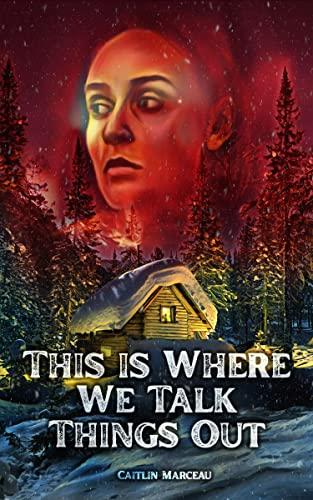You are here
Home › Books › Family Is The Deadly Tie That Binds In Caitlin Marceau's Masterful Novella 'This Is Where We Talk Things Out' ›Family Is The Deadly Tie That Binds In Caitlin Marceau's Masterful Novella 'This Is Where We Talk Things Out'
FTC Statement: Reviewers are frequently provided by the publisher/production company with a copy of the material being reviewed.The opinions published are solely those of the respective reviewers and may not reflect the opinions of CriticalBlast.com or its management.
As an Amazon Associate, we earn from qualifying purchases. (This is a legal requirement, as apparently some sites advertise for Amazon for free. Yes, that's sarcasm.)

True to the old saying, family is the tie that binds. No matter how much we grow and change as individuals, from womb to tomb we are inescapably a part of that unchosen genetic lineage whether we like it or not. Often that blood bond is a beneficial boon--ideal families love us, raise us, teach us, but sometimes, for an endless variety of reasons, families don't get along, and over time disagreements, arguments and long-lingering animosities cause rifts that can be difficult, if not impossible to bridge. In any other social situation resolution could be achieved through a mutual (or forced) parting of ways, but if a relative becomes toxic to your life, then what? Is it ever possible to completely sever those hereditary links?
That's the core question in DarkLit Press' latest release, Caitlin Marceau's gripping novella, This Is Where We Talk Things Out, a bleak portrait of a fractured family. The narrative centers on Miller, thirty-four-years-old and living a content life in the city with her partner Florence, who becomes unhappily lured into spending a weekend at a remote Canadian cabin with her estranged mother, Sylvie. Having grown up at odds with Sylvie's smothering, controlling and manipulative behavior, and still emotionally raw from losing her father to Alzheimer’s, Miller has long since erased her mother from her life. But when Sylvie approaches with apparent olive leaves and a request that they try to mend fences one final time, Miller allows herself to be guilt-tripped into taking the drive against both Florence's advice and her own better judgment.
Sylvie's planned retreat takes an immediate turn for the strange when Miller discovers her mother's newly-bought cabin has been retrofitted to resemble her childhood home as closely as possible, from the furnishings, dishware and towels to a near-perfect recreation of Miller's teenage bedroom, right down to posters on the walls and the clothes in the drawer. With arguments already flaring over past hurts and Miller psychologically reeling from her surroundings, Sylvie's domineering personality progressively asserts itself in disquieting ways: she confiscates Miller's phone, intentionally destroys her modern garments and locks her daughter in the bedroom. When Miller suffers a horrendous accident out in the snow and a burgeoning blizzard conspires to trap the pair indefinitely within the cabin together afterwards, Miller realizes Sylvie has no intentions to ever let her leave. The only chance she has to survive the weekend, and her mother’s increasingly deranged behavior, is to plot her own escape, but with injuries that make walking difficult, can Miller overpower Sylvie, steal the car’s keys and make it back to civilization? And what’s the cause of that decomposing stench emanating from Sylvie’s own locked bedroom?
This Is Where We Talk Things Out is a horror fan's diabolical dream come true. The suspense is palpable, the mounting dread of Miller's situation laid out with prose that is smooth, fast and rapier-precise, and the lean, character-driven plot never falters with a single misplaced step. Miller and Sylvie are studies in contrast, and both women are so believably drawn that their fragmented relationship becomes instantly and realistically recognizable to anyone who’s ever dealt with a difficult parental figure. From the moment Miller places luggage in her mother’s car, Sylvie’s persnickety, overly-critical disposition reveals itself and the verbal jousting begins with pitch-perfect dialogue. Old wounds inflicted by each onto the other are exposed but, at least initially, Sylvie seems no more dangerous than any fussy, middle-aged mom until they reach the cabin. There her true insanity becomes evident, and Marceau cleverly unveils Sylvie’s mental instability in increments, at points even eliciting sympathy by insinuating she might be suffering from Alzheimer’s the same as her late husband.
Fans of Stephen King’s Misery will revel in This Is Where We Talk Things Out. The suffocating, claustrophobic atmosphere, the slowly escalating conflict and confined, isolated winter location, the physical incapacitation and entrapment--it’s the material from which nightmares are woven. If there’s any let down, it would be in the too-easily surmised climactic revelation in Sylvie’s bedroom; to any horror fan familiar with Norman Bates the idea will be less shocking than to casual readers, but even guessing it beforehand does little to blunt the intended macabre impact. The novella’s briefness, too, is worth note; it’s short enough to be devoured in a single devoted sitting, but one becomes so embroiled in the circumstances, so attached to Miller’s plight, that the pages fly by far too quickly, leaving readers ravenous for more.
Tense, terrifying and heartbreaking all at the same time, Marceau’s mini-masterpiece of modern horror has all the hallmarks of an unstoppable up-and-coming genre talent, and I heartily give This Is Where We Talk Things Out a well-deserved 4.5 (out of 5) on my Fang Scale. Hollywood, take note: this would make one hell of a good movie. HIGHLY recommended.


